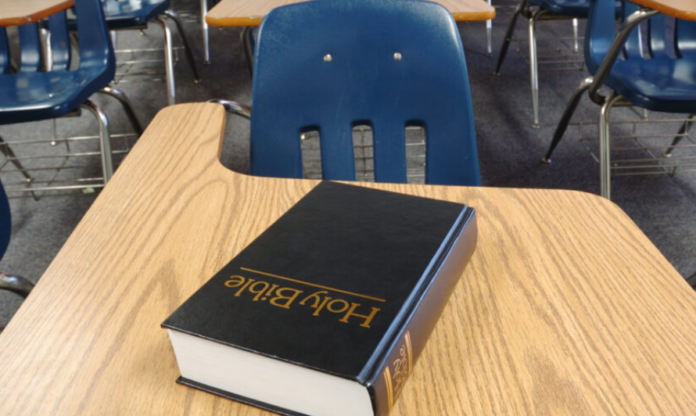By Casey Smith
Indiana Capital Chronicle
INDIANAPOLIS — After months of debate over where to draw lines between church and state, Indiana lawmakers approved a bill to guarantee students’ access to religious instruction.
Nixed from legislation, however, was a contentious provision to bring paid chaplains into Indiana’s public schools.
House Bill 1137 requires schools to approve parental requests for students to leave class during the day for religious instruction. The proposal, authored by Rep. Kendell Culp, R-Rensselaer, received final House approval on Thursday and is expected to get the green light from the Senate Friday morning.
Culp’s bill aims to tighten existing Indiana law that already permits students to leave school for up to 120 minutes a week for voluntary religious instruction, as long as it takes place off school property, and private transportation is provided.
From ‘may’ to ‘shall’
A 1952 U.S. Supreme Court ruling affirmed that “released time” programs are constitutional nationwide. As such, Hoosier parents can request religious instruction time for their child, but school administrators do not have to give approval.
Under the house bill, that “veto power” over the parent goes away, Culp said.
When a parent of a public school student provides a written request, the principal “shall” allow the student to attend outside religious instruction that is organized by a church or religious organization. The legislation also says a school principal must work “in a collaborative manner” with the parent to find the best time during the school day for a student to leave the school.
Entities offering religious instruction must work with schools to take students out during times that are “least disruptive to the instructional time.”
Even so, Democrats — including Rep. Ed Delaney of Indianapolis — said they didn’t think a third-party should dictate when kids are released from school.
“This bill goes too far,” DeLaney said, adding that organized, out-of-school programming would be “disruptive to the learning environment.”
Multiple organizations around the state — mainly Christian-centered — offer out-of-school curriculum for religious teaching. Earlier in the session, Culp said some Hoosier school districts have denied such organizations from pulling students out of school for religious instruction, prompting the legislation.
School chaplain language taken out
But deleted from the bill was language first drafted by Sen. Stacey Donato, R-Logansport, in Senate Bill 50, which would have allowed chaplains to take on roles as school counselors.
She previously said her proposal could help traditional school counselors who are struggling to manage large caseloads and increasing numbers of students in need.
The Senate education committee added the chaplain provision to Culp’s bill last month after the House refused to hear Donato’s bill. It stipulated that chaplains could only provide secular guidance, except for emancipated minors or with a parent’s permission.
Still, Democrats and other critics held that could go against the wishes of a student or parents “who aren’t on the same page.” Members of the minority caucus largely voted against the measure and said they would rather focus directly on Indiana’s ongoing school counselor “crisis.”
Chaplains can already volunteer at public schools. The measure made clear they can be employed to provide “secular support” to students and school employees, given they have a master’s degree in divinity, theology, religious studies, or a related field, as well as two years of “counseling experience.”
In committee, multiple chaplains testified that most seminaries do not require courses in counseling childhood or youth psychosocial development. They worried, too, that the legislation would also make it difficult for chaplains to maintain “appropriate” professional boundaries.
* * *
The Indiana Capital Chronicle is an independent, nonprofit news organization dedicated to giving Hoosiers a comprehensive look inside state government, policy and elections. The site combines daily coverage with in-depth scrutiny, political awareness and insightful commentary.





